Agriculture & Environment
Mak-RIF, CAES Open Day: VC Reveals Plan to Establish a University-wide Research & Innovations Incubation Centre
Published
4 years agoon
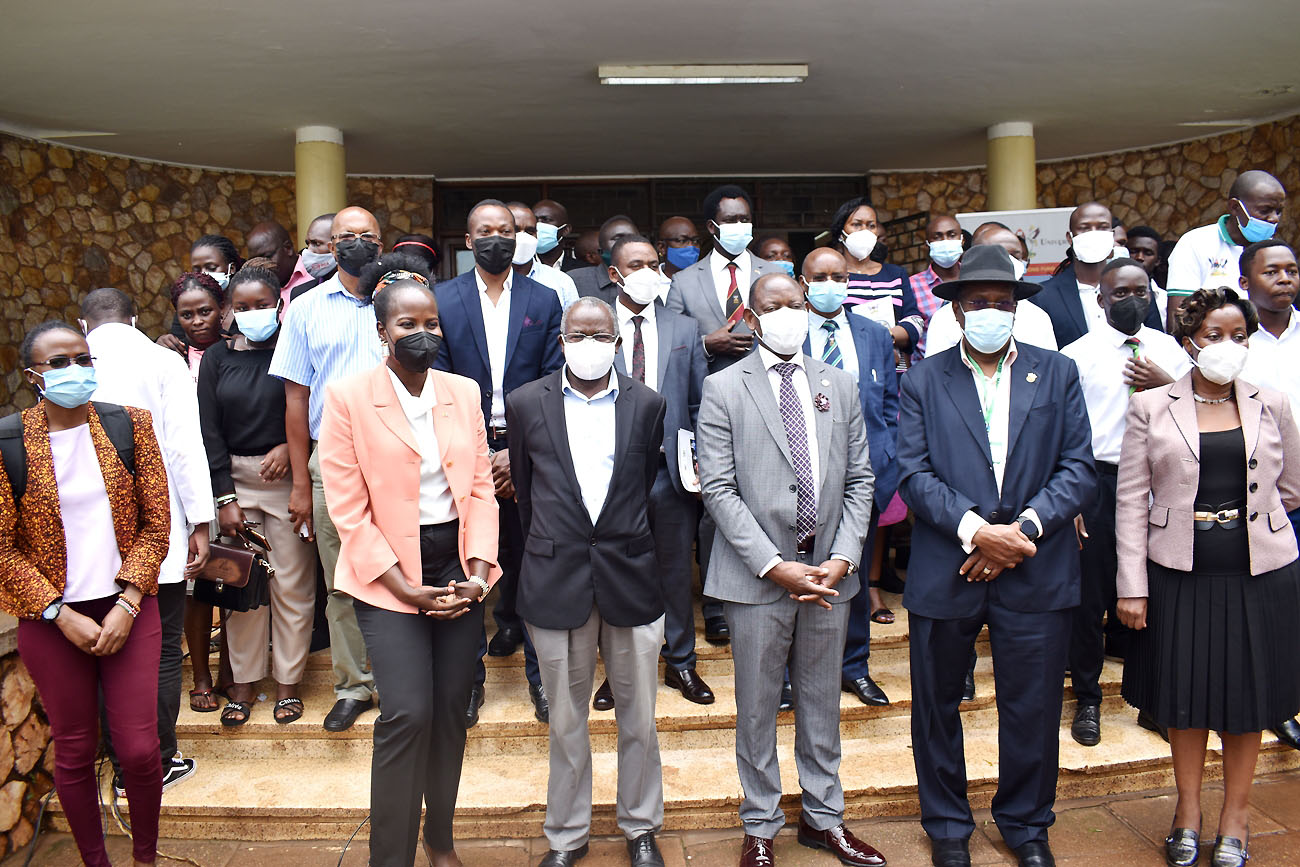
Plans are underway to establish a University-wide Research and Innovations Incubation Centre. This was revealed by the Vice Chancellor, Prof. Barnabas Nawangwe during the College of Agricultural and Environmental Sciences (CAES) Open Day held on 14th December 2021 to showcase outputs of some of the research projects supported by the Government of Uganda through the Makerere University Research and Innovations Fund (Mak-RIF). The event was presided over by the Permanent Secretary, Ministry of Agriculture, Animal Industry and Fisheries (MAAIF), Maj. Gen. David Kasura Kyomukama. It was attended by, among others, the representative of the Chair Grant Management Committee, Assoc. Prof. Isa Kabenge; stakeholders in the agricultural sector; the Principal, CAES, Prof. Bernard Bashaasha; the Deputy Principal, Dr.Gorettie Nsubuga Nabanoga; members of the Mak-RIF Secretariat led by Ms. Phoebe Kamya Lutaaya; and members of staff and students of Makerere University.
Touring the exhibition stalls, the Vice Chancellor said Management was fast-tracking the formation of a university-wide Research and Innovations Incubation Centre to support researchers to improve their prototypes. “The projects we have seen today are very impressive.It is gratifying to note that our researchers are actively working with communities to address various challenges. This is clear testimony that we are on the right track as a University. I take this opportunity to congratulate all researchers for the great innovations,” he said.
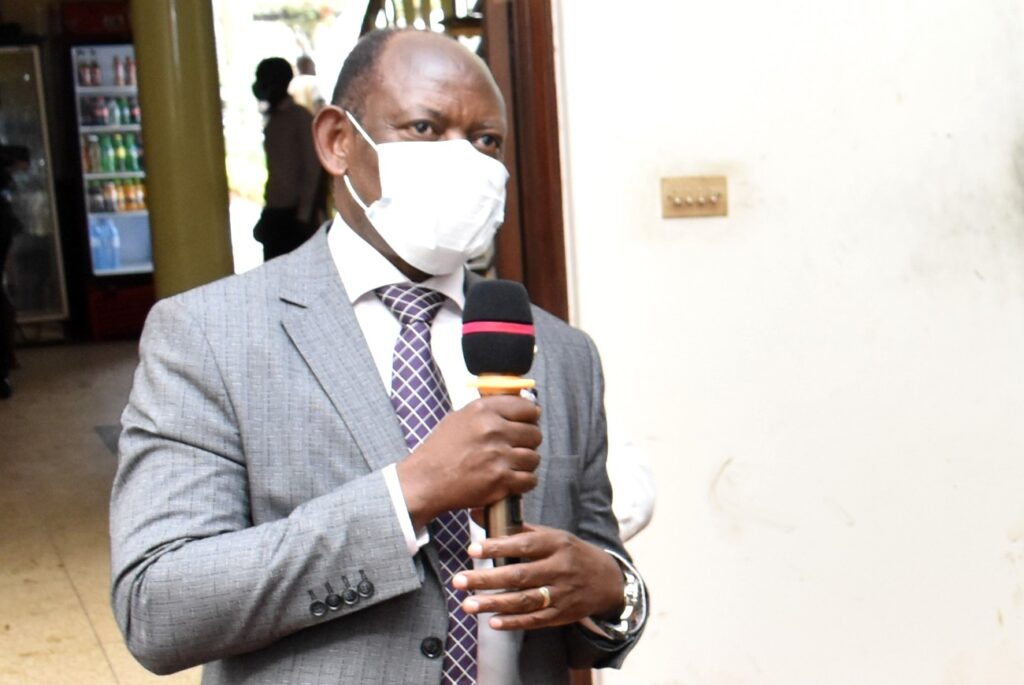
Emphasizing the critical role played by universities in the development of nation states, the Vice Chancellor said Makerere had reached a stage of churning out companies that can transform the country’s economy in the shortest time possible. “Through the Research and Innovations Incubation Centre, this can be achieved. It is our responsibility to ensure our country remains stable by creating employment for multitudes of young people, and enhancing food security. I therefore appeal to the government to support the establishment of the centre.”
The Vice Chancellor reminded the researchers of the need to patent their work. He also advised them to work towards commercialising their products. He expressed gratitude to the Government of Uganda for the continued support towards research and innovations at Makerere University. He also appreciated the University Grant Management Committee for negotiating the support and ensuring it is put to good use. The Vice Chancellor commended the Mak-RIF Secretariat for working tirelessly to ensure the research conducted does not remain on the shelves but is widely disseminated to foster uptake and economic transformation.
During the event, researchers from CAES showcased outputs of various projects including;
- Unlocking the commercial potential of Canariumschweinfurthi (Empafu) indigenous fruits for improved livelihood in Central Uganda – Prof. Jacob Agea. The main objective of the project was to develop high value commercial innovations from the fruit. Specific objectives were to formulate high value wine and jam innovations from the fruit pulp and to assess consumer market acceptability for developed wine and jam innovation.
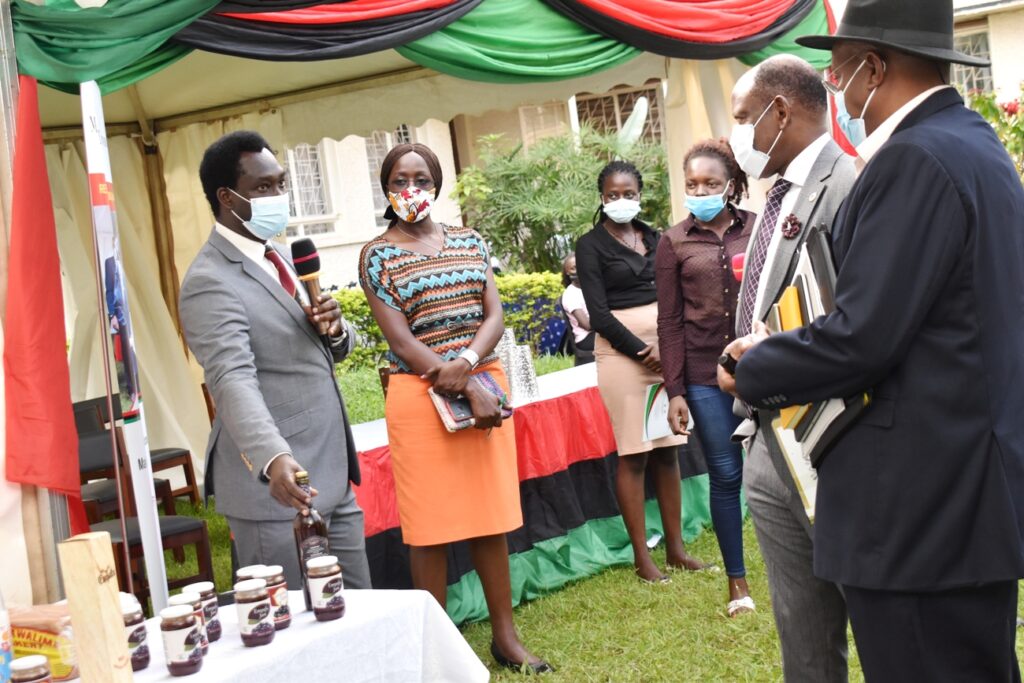
- Design, construction and evaluation of an automated continuous pasteurizer –Dr Emmanuel Baidhe, Dr Julia Kigozi. Along the juice processing chain, thermal processing by pasteurization is considered to be the most crucial of all unit operations as it increases the shelf life of the juice. Several batch pasteurizers have been locally developed and adopted. However, with the batch system, a particular volume of product is processed per unit time. It is therefore very cumbersome for a processor with large volumes since they have to keep emptying and refilling the vat. It requires a lot of resources in terms of labour (Amit et al., 2017), time and energy to have large quantities of juice processed. The purpose of the study was to design, simulate, construct and assess the performance of the low-viscous juice continuous pasteurizer.
- Enhancing Value addition on Potato-Sorghum enterprises for Improved Livelihoods in Uganda (EVaPoSIL) -Prof. Johnny Mugisha. Potato (Solanumtuberlosum) and sorghum (Sorghum bicolar) are potential pathways for enhancing household incomes, food and nutrition security in South-western Uganda which is characterized by land scarcity, decreasing agricultural productivity, high post-harvest losses and low per-capita income. Potato and sorghum are the region’s main enterprises but their economic and nutrition potential are not fully exploited. Sorghum productivity and profitability are very low and potato harvest losses in form of non-marketable tubers are high. The project sought to enhance the value of both crops by innovative value addition that makes them complements, reduce harvest losses, increase incomes, and make available to consumers a diversity of high quality products. The overall objective was to improve the economic value of potato and sorghum enterprises for improved livelihoods of the value chain actors.
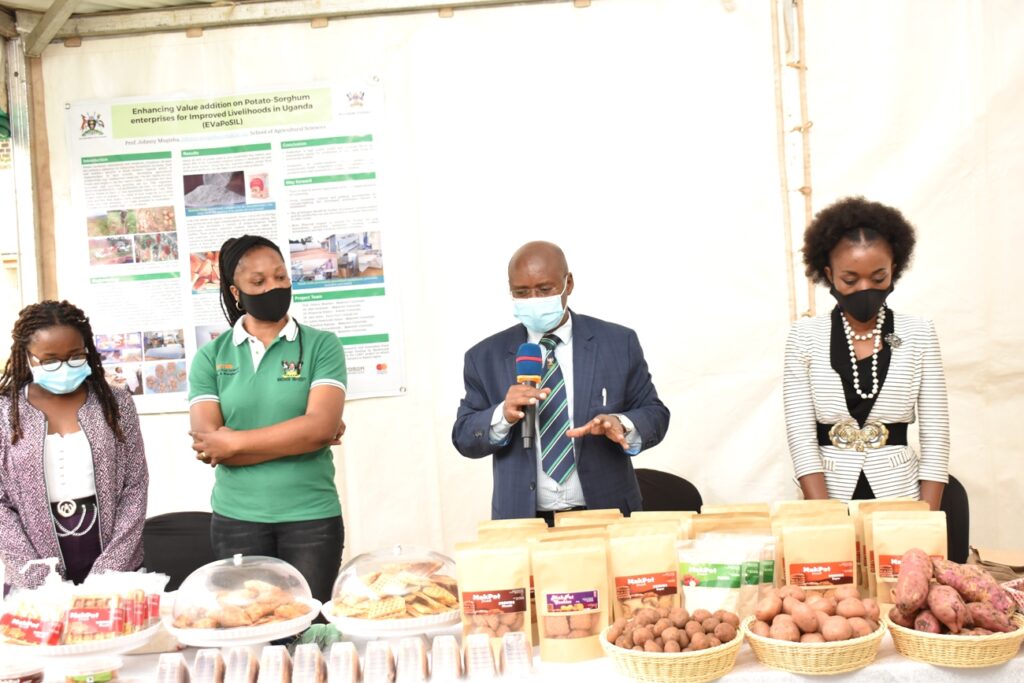
- Developing dry season feeding technologies for different cattle production systems in Uganda – Dr Justine Nambi-Kasozi. Scarcity, high cost and fluctuating quality of feeds are major constraints to sustainable cattle production in Uganda, particularly during the dry seasons. Use of crop residues plays an important role in reducing feed stress. However, most crop residues are bulky and low in nutrient content hence unable to support maintenance and production requirements of cattle. The objective of this project was to develop crop residue-based multi-nutrient blocks (MNB) and pellets to increase the intake and utilization of crop residues for dry season feeding.
- Digitalizing the Makerere University Soil Test Kit for rapid soil assessment, improved soil management, crop yields and incomes among farmers in Uganda – Emmanuel Opolot. Accurate assessment of soil is key for its sustainable use and management. The Makerere University Soil Test Kit (MAK-STK) comes in handy. It gives results of five soil parameters (pH, N, P, K and SOM) within minutes. However, the results from the MAK-STK are qualitative and thus hard for agricultural extension workers to advise farmers on how much nutrients to add to the soil. The project objectives were to (i) calibrate the MAK-STK with laboratory data for major soil types in Uganda, (ii) develop a digital platform through which the MAK-STK results can be quickly and easily translated to fertilizer recommendations and (iii) build capacity of the agricultural extension officers, farmers and fertilizer input dealers on the use of the Makerere University Soil Test Kit and its digital platform.
- Development of a Safe and Efficacious Anti-malarial drug from Traditional medicine -Prof. John Tabuti. Malaria is still a leading source of illness and death. In 2017, about 219 million suffered from malaria worldwide, with 92% of cases occurring in Africa. Malaria management is complicated by the fact that access is still limited in some places, and there is a possibility of treatment resistance.The goal of this research was to contribute to the development of a safe and efficacious anti-malarial. The specific objectives were: to compile a list of malaria treatment plants in Tororo District and prioritize them to determine the safety of the malaria treating plants.
- Deployment of the new Maksoy soybean varieties for on-farm income enhancement, Food and Nutrition security, Enterprise Development and Job creation in Eastern Uganda – Prof. Phinehas Tukamuhabwa. Over the last 10 years, Makerere University developed six improved soybean varieties namely MAKSOY 1N, 2N, 3N, 4N, 5N and 6N. Unfortunately, the potential of the new MAKSOY soybean varieties had not been fully exploited due to limited farmer access to seed in addition to low skill set in soybean agronomic practices that subsequently leads to low yields. Further, each of the soybean varieties has specific attributes for protein, oil, maturity and yield in the field and efforts had been made to enhance their adoption in different parts of Uganda. However, the role of soybean in contributing to food and nutrition security of different households and communities in the country remains a critical challenge. This project focused on harnessing the value of the different soybean varieties through value addition using soymilk and soy flour for adoption by households, SMEs and also to set up a Soy Processing Unit at MUARIK.
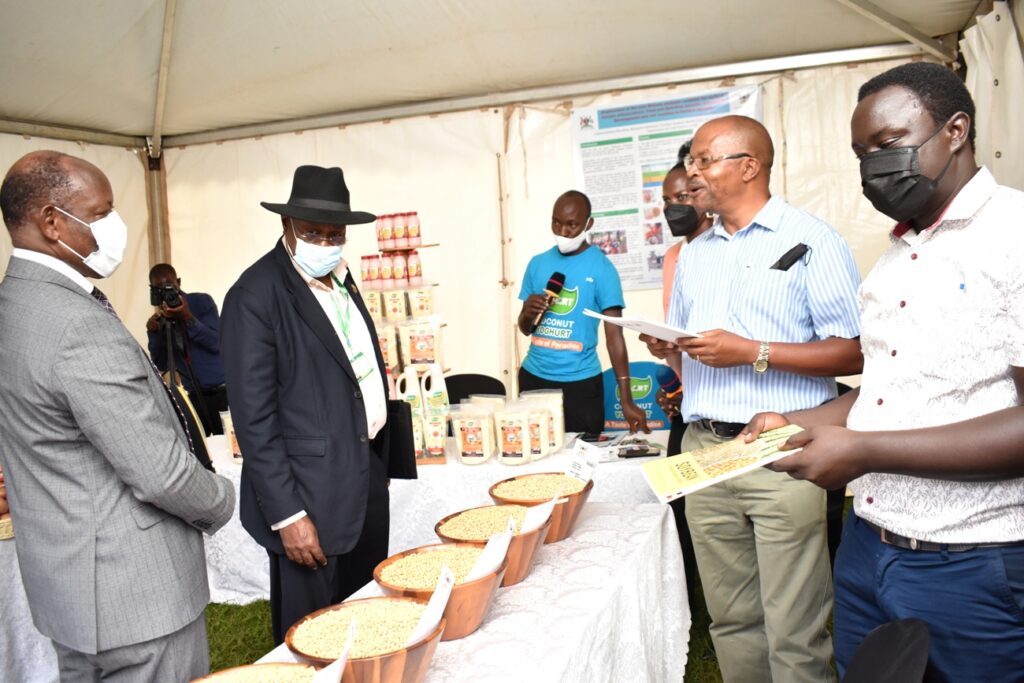
- Improving access to biodiversity data for conservation decision making: A case of the National Biodiversity Data Bank, Makerere University, Uganda – Daniel Waiswa. This project sought to revitalize the NBDB as a one-stop biodiversity data centre enabling easy and fast access for sound biodiversity conservation decision making. The overall objective was to improve access to biodiversity data for conservation decision making while the specific objectives were to: increase stakeholders’ engagement and confidence in the NBDB for enhanced biodiversity data sharing and access, re-designing and operationalizing the NBDB Database for reception, storage and open access to data and enhancing and sustaining the staffing, capacity and infrastructure of the NBDB.
- A Pedal-Operated Seed Cleaner (PoS-Cleaner) To Boost Post Harvest Grain & Legume Quality, Increase School-Study time & Create Financial Freedom in Rural-Uganda – Peter Tumutegyereize. Sub-Saharan Africa (SSA) annually registers 40-50% of food Post-Harvest Losses (PHLs) worth US$4 billion with 41% and 26% respectively grains & legume losses in Uganda. Maize grains lost alone, could feed over 1.14 million persons for a full year. These losses along the food chain are greatly attributed to poor seed sorting or cleaning. Unclean seeds and foreign materials promote mold development resulting to dry matter loss, nutritional changes, seed quality loss, aflatoxin contamination and PHLs during storage and processing. Despite this, majority of small-scale farmers have no access to appropriate seed cleaning technologies. The available imported seed cleaners in Uganda are energy and cost demanding in terms of ownership, operation and maintenance. Farmers depend on traditional screening or winnowing which is inefficient, time consuming, labour intensive and dust exposure resulting into ill health. For rural schools that depend on in-kind food tuition contributions from parents, students traditionally clean seeds hence reducing their study time and educational performance. The study sought to create intermediate but appropriate post-harvest cleaning technologies.
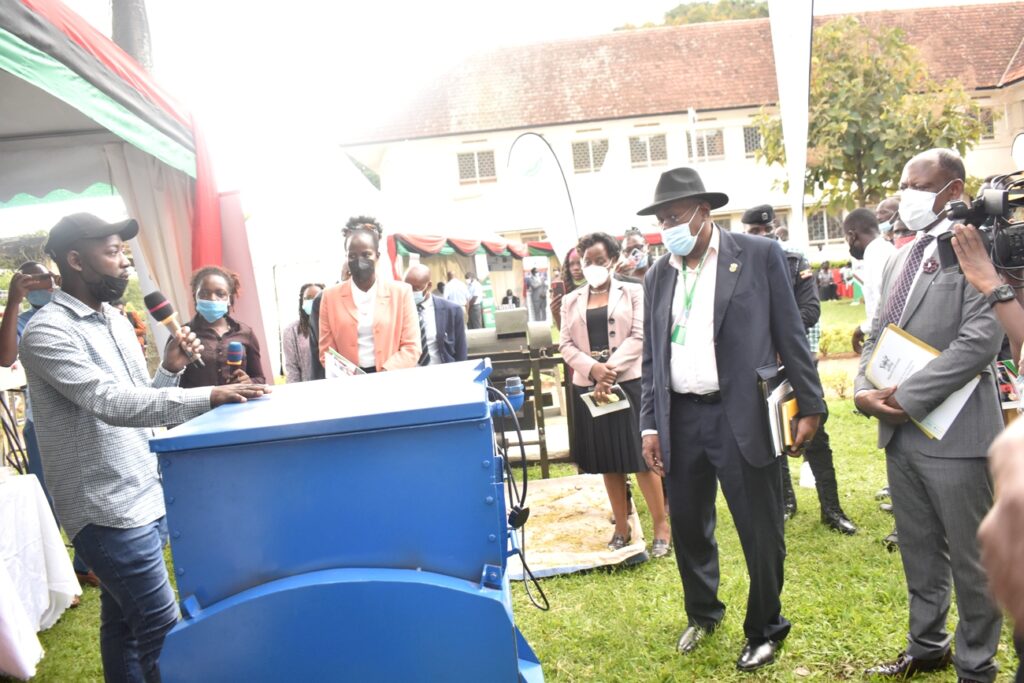
- Developing an automatically controlled commercial solar-dryer and efficient resource recovery innovations for sustained market responsive fruit production in Uganda -Ahamada Zziwa. Food insecurity and poor livelihoods continue to prevail in Uganda partly due to high post-harvest losses, limited value addition options and low farm-gate prices particularly for perishable foods (FAO, WFP and IFAD, 2019). The lack of affordable preservation options contributes to over 30% post-harvest losses because majority of farmers have no access to electricity for processing and preserving perishable foods. Harnessing solar energy and its use for food preservation is a viable option for most off-grid farmers. However, the existing solar dryer designs are limited in drying efficiency due to absence of temperature and relative humidity controls which undermines their ability to ensure consistent physical and nutritional quality of dried products. Most dryers are also small drying capacity designs based on only solar light as the drying power which renders them unsuitable for large scale drying and uneconomical (Shaikh and Kolekar, 2015). The project aimed to: 1)design, construct, test and promote a sensor-controlled dual heat source (Hybrid) solar dryer to ensure consistent drying of reasonably large volumes of perishable produce; 2) investigate vermicompost recovery from pineapple waste and cow dung; and 3) optimise biogas production from pineapple waste.
- Development of Nutrient-Dense Recipes and Products from Underutilized Crops to Alleviate Malnutrition among HIV/AIDS Infected Persons in Western Uganda – Agnes Nabubuya. Human Immunodeficiency Virus (HIV) is a global pandemic that is currently affecting 3.7 million people worldwide of which 70% is found in Sub-Saharan Africa. Uganda continues to suffer from scourge of HIV with current prevalence at 7%. Healthcare of people living with HIV/AIDS (PLWHA) in Uganda is constrained by poor nutrition, with estimates of 25% suffering from malnutrition. This project addressed the challenge of malnutrition in PLWHA by using underutilized crops through development of nutrient-dense recipes and products. The research team analysed the nutritional composition of identified underutilized crops and developed nutrient-dense recipes and products for PLWHA.
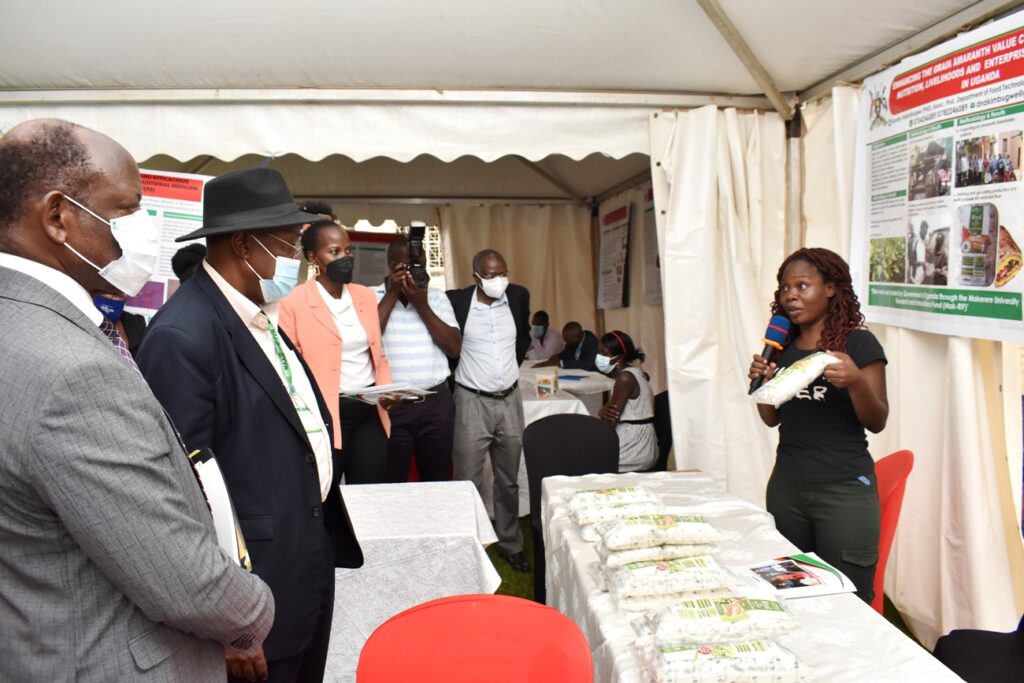
- Strengthening the resilience and visibility of peri-urban poultry farmers in Wakiso for better marketing and profitability through feeding, post-harvest handling, value addition and resources recovery – Ahamada Zziwa. Globally, COVID-19 has had adverse impacts on the poultry value chain through infecting workers, farmers, stalling production, disrupting the supply chain, and thus affecting product demand. The lockdown led to socioeconomic restrictions and distortions in community dynamics, marketing and sale of products leading to huge losses in the poultry sector (FAO, 2020; Poudel et al., 2020). Transport restrictions to poultry farmers and closure of national borders, weekly markets, institutions, schools, hotels and restaurants, which were the main markets, left farmers with large quantities of unsold poultry products, resulting in financial losses especially to farmers without value-addition options and resources recovery innovations. The overall objective of the project was to strengthen the resilience and visibility of peri-urban poultry farmers for sustained poultry production, better marketing and enhanced profitability through innovative feeding, post-harvest handling, value addition and resources recovery.
- Optimized software for planning and simulation of food aid response during the COVID-19 pandemic and other similar disasters in Uganda – Fildah Ayaa. Covid-19 was declared a pandemic on 11th March 2020. First lockdown measures to contain the spread of the virus effected on 31st March 2020. Covid-19 lockdown disrupted food supply systems, causing food insecurity, especially in urban areas.Uganda’s government food distribution efforts were frustrated by poor planning for both food stock and manpower. Only 12 % of the total population received food aid during lockdown period. Of these, 24% were urban residents and only 7% lived in rural areas (Acayo,2020). The research team designed software for authorities to plan for food distribution during and after the Covid-19 pandemic in Uganda.
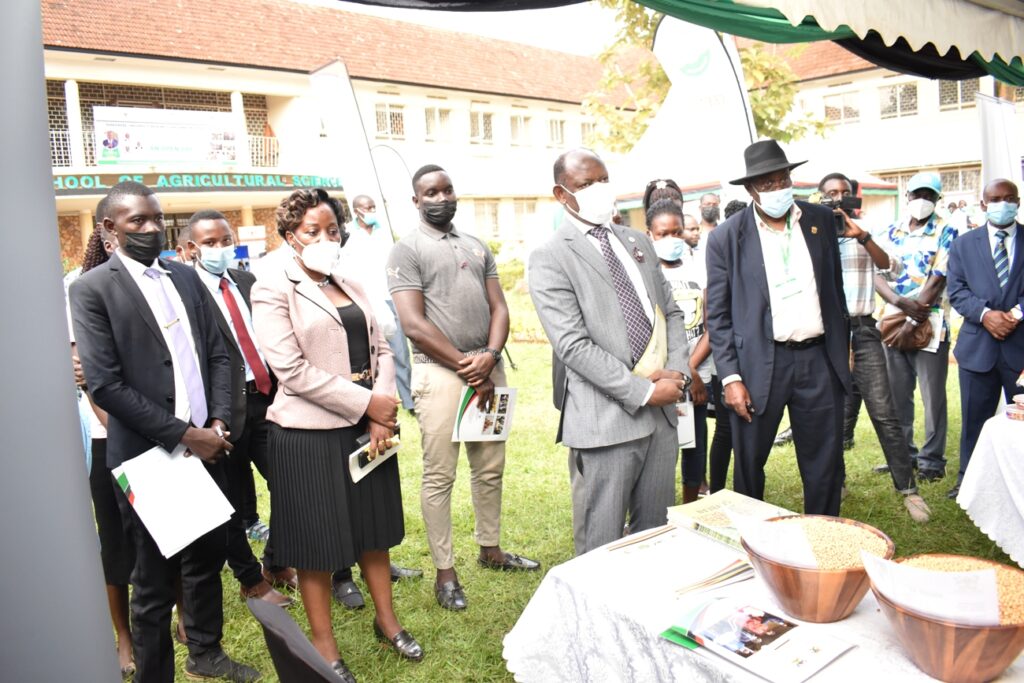
- Development of a Green Low Cost Touchless Handwash Technology (TW-20 Kit) For Public Shared Spaces – Joshua Wanyama. Effective hand washing with soap for at least 20 seconds and limiting contacts are useful COVID19 preventive measures. However; the existing point-of-hand washing systems are ineffective in achieving the set measures as most of them require individuals to touch the units, have no mechanism in place to ensure hand washing with soap for the recommended time and are therefore prospective contagion points for the pandemic (WHO 2020). There was therefore, a need to develop a low-cost hand washing technology that automatically releases soap detergent without contact and allows users to rub and scrub the hands with soap for 20 seconds before water is released for rinsing. The project aimed to provide a safe water and hygienic technology to boost behavioural hand washing culture and reduce the risk of SARS-COV-2 human to human transmission in public shared spaces. The specific objectives were: i) to re-evaluate and modify the first prototype of TW-20 Kit V1.1 design customized for public settings, ii) to influence public behavioural change towards hand hygiene and product validation by undertaking a comprehensive pilot study in selected shared public spaces in Kampala Metropolitan Area.
- Design and development of an atomized spray drier for egg powder production for use in bakery industries of Uganda – Kivumbi Hussein Balimunsi. Due to the introduction of fast growing breeds of chicken in Uganda, there has been enormous production of high quality eggs, making the country one of the largest egg producers in the region. However, due to the outbreak of COVID19 and the subsequent lockdowns, the prices of eggs drastically reduced to nearly 5000 UGX per tray consequently affecting chicken farmers. This was further worsened by the lack of value addition to the available eggs leading to huge losses. This project sought to explore the utilization of spray drying in the production of high-value products from eggs in Uganda as a measure to minimize losses.
- Automation of communal hand water pumps to eliminate COVID-19 transmission – Nicholas Kiggundu.The research was motivated by the observation that alternative solutions of limiting the spread of COVID-19 such as washing hands with water and soap or use of chemical sanitizers are difficult to enforce especially in the low income rural and peri-urban communities where the boreholes are found. The researchers invented MAKNAI an acronym for the Makerere University – MAK NAyIkondo – vernacular for borehole, a prototype to automate cranking of the hand pump that draws water from a well. Designed by a team from the Department of Agricultural and Biosystems Engineering (DABE), School of Food Technology, Nutrition and Bioengineering (SFTNB), College of Agricultural and Environmental Sciences (CAES) the prototype consists of a PV (photovoltaic) panel, battery, solar charge controller, inverter, motor, pulleys, belt, reciprocating arm and a foot switch. The foot switch serves to replace the use of palms and fingers to crank the pump handle, as is the practice while drawing water at boreholes.
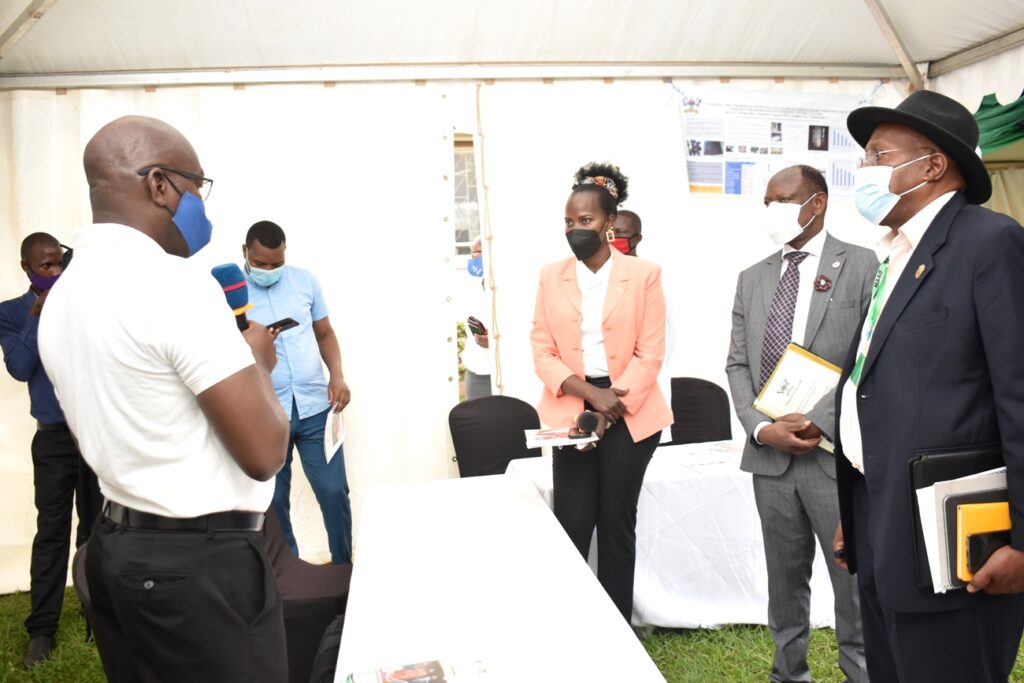
- Empowerment of the Agro-Processing Industry to meet the Quantity and Quality Standards for the Local and Export Market; a Programme Enhancing the Practical Skills of Students in Makerere University – Julia Kigozi.
- Mountain Gorilla Tourism Re-examined: Implications of increased visitor numbers to the welfare and behaviour of mountain gorillas in Bwindi Impenetrable National Park, Uganda – Prof. David Mwesigye Tumusiime.
- Developing Biofertiliser Formulations to Unlock Crop Productivity for Improved Food Security and Household Livelihood in Uganda – John Baptist Tumuhairwe
Remarks by the Permanent Secretary, MAAIF (Guest of Honour)
Addressing participants, the Permanent Secretary, Ministry of Agriculture, Animal Industry and Fisheries, Maj. Gen. David KasuraKyomukama commended the innovations at CAES and Makerere University in general. He applauded Makerere University Management and Council for creating an enabling environment for research and innovations. Maj. General Kasura appreciated the Government of Uganda for the enormous investment in research at Makerere and other Institutions of Higher Learning.“With guidance from the President of the Republic of Uganda, H.E Yoweri Kaguta Tibuhaburwa Museveni, the Government has invested heavily in research, one of the major drivers of economic development. The Government has supported the formation of various initiatives aimed at advancing research in the country. In particular, the Government has supported the creation of several research initiatives at Makerere University. This is highly commendable and a great stride towards transforming our economy,” he noted. He appealed to the researchers to invent more technologies to aid the production of quality agricultural products in the country. “We should always ensure our agricultural products are 100% free of aflatoxinto avoid reputational damage,” he advised. Maj. Gen. Kasura pledged support towards the commercialization of the research outputs. He urged the researchers to extensively disseminate their work, saying that knowledge that is not shared is useless.
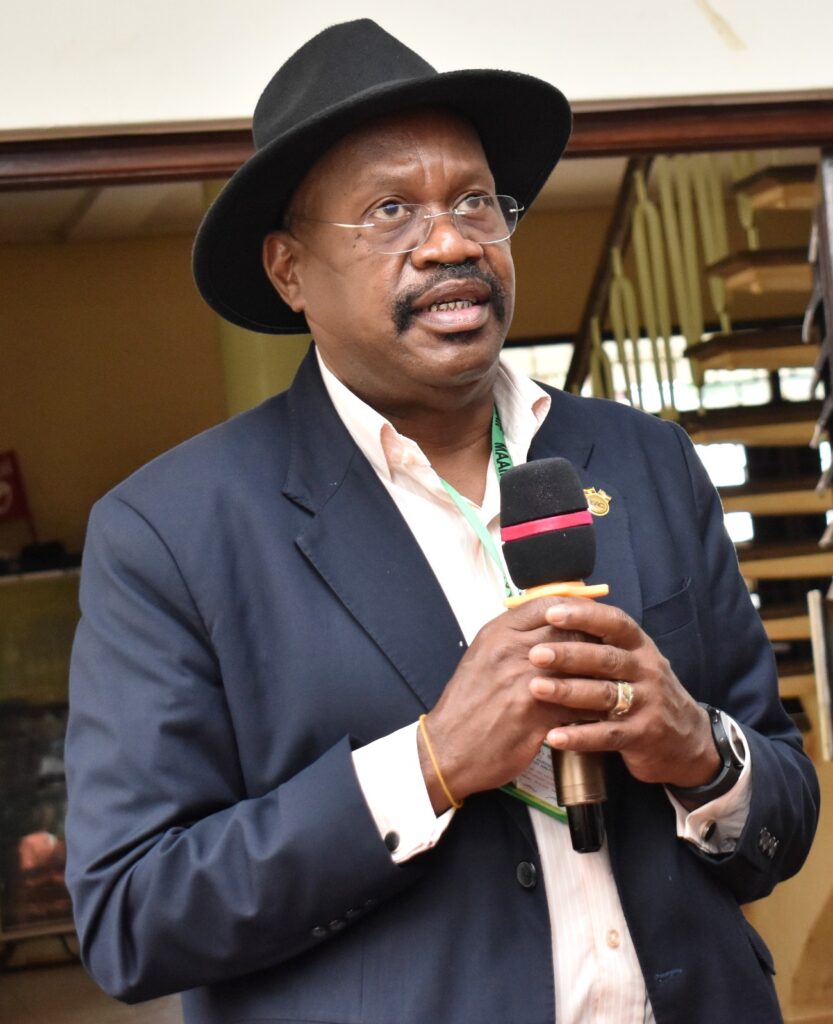
The representative of the Chair, Makerere University Grant Management Committee, Prof. Isa Kabenge expressed gratitude for the support rendered by the Government, noting that the impact of the research projects is invaluable. Since Financial Year 2019/20, the Government through Mak-RIF has supported 711 multidisciplinary research and innovation projects across the 10 colleges of Makerere University. The College of Agricultural and Environmental Sciences (CAES) has obtained 79 projects across the three financial years.
In his remarks, the Principal, CAES, Prof. Bernard Bashaasha applauded the researchers for the great initiatives. He extended appreciation to Makerere University Management, the Government of Uganda, and development partners for supporting the researchers to explore their full potential. “The research generated at the College is highly commendable and has played a critical role in shaping the national and global policies,” he said.
Similarly, the Deputy Principal appreciated the researchers, CAES Management, the University Management, Government and development partners for the support that has enabled the college to generate productive research.
About Mak-RIF
The Makerere University Research and Innovations Fund (Mak-RIF) is a funding stream to support generation and translation of high impact research and innovations to drive Uganda’s development Agenda. This initiative is funded by the Government of the Republic of Uganda.
Objectives of the Fund
- Developing and funding a robust research agenda based on National development priorities identified from academia, government, implementing partners, and industries.
- Supporting the dissemination of high-quality research and innovations in a way that impacts development policies and programs.
- Supporting the growth of research leadership capacity in the university.
You may like
-


Over 9,200 to graduate at Makerere University’s 76th Graduation
-


76th Graduation Highlights
-


Mak Selected to Host Alliance for African Partnership Africa Office
-


Mak hosts First African Symposium on Natural Capital Accounting and Climate-Sensitive Macroeconomic Modelling
-


Uganda Martyrs Namugongo Students Turn Organic Waste into Soap in an Innovative School Project on Sustainable Waste Management
-
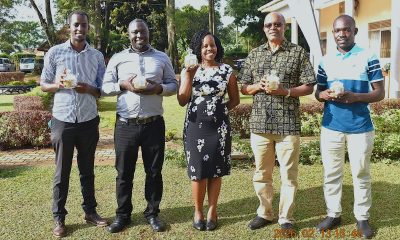

Makerere University Researchers Release New Soybean Variety, MakSoy 7N
Agriculture & Environment
Mak hosts First African Symposium on Natural Capital Accounting and Climate-Sensitive Macroeconomic Modelling
Published
5 days agoon
February 20, 2026
African economies are increasingly exposed to climate-related shocks that threaten development gains, fiscal sustainability, and macroeconomic stability. From extreme weather events and biodiversity loss to the depletion of natural capital, climate risks are reshaping economic realities across the continent. Yet many macroeconomic frameworks used in public finance and planning continue to overlook climate and nature-related risks and the long-term benefits of resilience and adaptation investments.
To address this emerging reality, over 250 participants from Africa, Europe and beyond, convened at Makerere University – Kampala, on the 12th and 13th of February 2026, to participate in the First African Symposium on Natural Capital Accounting and Climate-Sensitive Macroeconomic Modelling.
Following the theme, “Climate-Sensitive Macroeconomics: Rethinking Growth in Africa’s Natural Resource Base, the hybrid symposium organized by Makerere University through the Centre of Excellence for Africa Climate-Sensitive Macroeconomic Modelling (CEACM) within the School of Economics, under the College of Business and Management Sciences (CoBAMS), the Environment for Development Initiative (EfD), and the Ministry of Finance, Planning and Economic Development (MoFPED) in Uganda, brought onboard ministers, leading economists and planners, researchers, policy makers, the academia, development partners, climate change experts and the media.
The Symposium being the first of its kind on the continent, reflected Africa’s growing determination to work collectively in confronting shared development challenges, building on recent momentum such as the formation of Pan-African Finance Ministers Forum for Climate Action (PAFMCA).
Featuring speeches and presentations from notable speakers and partners, a keynote address on Natura Capital Accounting and Climate Change Nexus in Africa and their impact on Fiscal Policy, panel discussions, expert opinions, and exhibition kiosks (World Café), the symposium presented a platform to strengthen Africa’s analytical and institutional capacity to integrate climate and natural capital considerations into macroeconomic and fiscal policy.
Vice Chancellor underscores the role of universities
Welcoming the delegates to Makerere University, the Vice Chancellor-Prof. Barnabas Nawangwe emphasized that universities must lead innovation and collaborative research efforts to support collective climate change mitigation across the continent.
In the same vein, he advocated for strong collaboration between universities in Africa and government Ministries. “Makerere’s collaboration with the Ministry of Finance, Planning and Economic Development, stands as a shining example of how academia and government can strengthen economic management,” he said.

Prof. Nawangwe revealed that the collaboration between Makerere University and the Ministry, has strengthened macroeconomic modelling, fiscal policy analysis, and technical capacity within government. In addition, the partnership led to the establishment of the Centre of Excellence for Africa Climate-Sensitive Macroeconomic Modelling, bridging academic scholarship with real-world policy application.
“We have jointly established the Centre of Excellence for Africa Climate-Sensitive Macroeconomic Modelling. The Centre (established in August 2025) is anchored within the School of Economics in the Department of Policy and Development Economics, under the Master of Science in Economic Policy and Investment Modelling, a program jointly facilitated by Makerere University, the Ministry of Finance, Planning and Economic Development and the Bank of Uganda,” he mentioned.
Climate and Economic transformation are inseparable
The Vice Chancellor highlighted the critical intersection between economic transformation and environmental sustainability, noting that economies in Africa, heavily dependent on natural resources, face unprecedented pressures from climate shocks, biodiversity loss, and environmental degradation. Convinced that economic growth cannot be pursued in isolation from climate and environmental realities, he stressed the importance of integrating natural capital accounting and climate considerations into national development strategies.
Prof. Nawangwe advocated for shared responsibility of universities, research institutions, and policymakers to develop innovative analytical tools, responsive policy frameworks, and strong institutional capacities that promote sustainable growth while safeguarding environmental assets for future generations.
The Vice Chancellor commended UN PAGE and the Global Green Growth Institute (GGGI) for funding the symposium, as well as, other stakeholders namely the European Union and the Coalition of Finance Ministers for Climate Action (CoFMCA), Ministry of Water and Environment (MoWE), National Planning Authority (NPA), Uganda Bureau of Statistics (UBOS), the National Environment Management Authority (NEMA) for being reliable partners.
Integrating Climate into Fiscal Policy
During the opening ceremony, the Minister of Finance, Planning and Economic Development, Hon. Matia Kasaija underscored the urgency of embedding climate considerations into economic planning.
“As Ministers of Finance, we are often confronted with difficult trade-offs. Our task is to balance the needs of today with sustainability for future generations,” said Hon. Kasaija, in a speech read by Hon. Henry Musasizi, the Minister of State for Finance (General Duties).

The Minister guided that traditional macroeconomic models focusing only on growth, inflation, and fiscal balance are inadequate in an era of climate shocks. He affirmed that African economies are facing interconnected challenges which directly impact economic growth. He stressed that traditional macroeconomic frameworks must evolve to systematically incorporate environmental degradation and climate shocks, whose consequences can no longer be ignored in policy analysis.
“For countries such as Uganda, whose development prospects are closely linked to natural resources and the climate-sensitive sectors, these challenges are not abstract. They affect livelihoods, public finances and long-term economic resilience,” he mentioned.
The Minister emphasized that natural capital accounting and climate-sensitive macroeconomic modelling are vital for valuing natural assets, assessing environmental costs, and guiding sound investment decisions.
Protecting Africa’s Natural Capital
Hon. Beatrice Atim Anywar, Minister of State for Environment, emphasized the urgent need to protect Africa’s ecosystems. “Africa stands at a defining crossroads. Our economies remain anchored in natural capital—forests, water resources, biodiversity, land, and ecosystems—which sustain life, generate fiscal revenue, and underpin development,” she said.
She warned that climate-related shocks are already undermining growth and public investment. “Floods, droughts, land degradation, biodiversity loss, and water stress are no longer distant risks. They are present realities, already affecting productivity and macroeconomic stability,” she said.
She emphasized the need for improved economic models that account for environmental and climate risks: “Traditional macroeconomic frameworks have not adequately captured climate risks or the long-term economic benefits of resilience and adaptation. This limits our ability to make informed policy decisions as Africa pursues economic transformation, energy security, and fiscal stability,” she stated.
Hon. Anywar highlighted collaboration with GIZ, Makerere University, and government ministries, which led to the development of the MONCAP (Model for Natural Capital Policy Assessment). “This tool is being used to assess natural capital assets for climate change, energy transition, and their linkages to the macroeconomy. It supports budgeting by estimating the cost of depleted natural capital assets,” she said.
“Water security, forest conservation, ecosystem restoration, and climate adaptation are not costs. They are investments in Uganda’s long-term economic stability, productivity, and prosperity.”
Stakeholders urged to transform climate threats into opportunities
Adam Sparre Spliid, the Deputy Head of Mission, Danish Embassy said: “Integrating climate risk and natural capital into our macroeconomics frameworks is not only academic exercise, it is a massive de-risking strategy for private investment. By bridging the gap between government policy and planning, academia and research, and the private markets, we transform climate threats into tangible opportunities.”
Sustainability includes youth, jobs and human well-being
Dr. Steven Stone, Chair of the UN PAGE Management Board, emphasized that sustainability extends beyond the environment to encompass youth, jobs, economic growth, and human well-being. “While the environment is Africa’s foundational source of wealth, sustainable development requires balancing ecological stewardship with economic progress, including income and employment for the youth which are critical priorities for countries such as Uganda.”
Dr. Stone highlighted that UN PAGE, originating from the Rio+20 Conference, supports climate-sensitive economic policy in Africa, emphasizing that dialogue, scenario-building, cross-sector collaboration, and strong partnerships are key to advancing sustainable, inclusive, and climate-resilient development.
Africa’s Wealth Declining
In the keynote address titled, Natural Capital Accounting and Climate Change Nexus in Africa and their Impact on Fiscal Policy, Paul Jonathan Martin, Manager of Environmental Operations at the World Bank for Eastern and Southern Africa, and a specialist with over 30 years in climate and natural resources, warned that Africa’s overall wealth is under threat due to declining renewable natural capital.
“Produced capital has increased by 20%, human capital by a third, but renewable capital has declined by 30%,” Martin said. “When combined, Africa’s overall wealth trajectory has been weakening since 2010.”
He stressed that natural resources must be treated as economic assets requiring systematic accounting: “Africa’s rich natural resources are fundamental for sustainable development,” he said.
Citing examples from Ethiopia and Kenya, he highlighted successful integration of natural capital into public investment and budget decisions. “In Ethiopia, there are payments for ecosystems and investment prioritization tools. In Kenya, natural capital accounting integration into budgets has strengthened public investments. Climate change has deep, cascading effects across sectors, but Africa has major potential to lead climate solutions,” he said.

Martin also highlighted the economic benefits of climate adaptation: “From 2020–2050, the cumulative effect of adaptation on Uganda’s GDP is positive. Without action, under a dry/hot climate future, GDP could significantly deviate from projected growth paths.”
Drawing on insights from over 70 country climate and development reports produced by the World Bank, the keynote speaker highlighted the profound macroeconomic impacts of climate change across Africa. He stressed the importance of integrating climate and natural capital into macroeconomic planning. He noted that Africa’s forests, water systems, and biodiversity are vital for sustainable development but face growing threats from climate change, environmental degradation, and climate-related disasters that undermine productivity, public investment, and economic stability.
He observed that traditional macroeconomic models often fail to capture the value of natural assets and regulating ecosystem services, which are critical to both economic stability and resilience but are largely excluded from GDP calculations.
Africa-Led Solutions
Prof. Edward Bbaale, Principal, College of Business and Management Sciences (CoBAMS), stressed the importance of developing African-led solutions. “We need to champion the Africa-led model. We need approaches that fit our unique context. Africa is not here to take in other frameworks blindly,” he said.
By supporting research, training, policy dialogue and modelling innovation, the Centre of Excellence for Africa Climate Sensitive Macroeconomic Modelling (CEACM) positions Makerere University as a regional hub for advancing climate-sensitive macroeconomic policy across Africa.
He highlighted CEACM’s capacity-building programs: “Our goal is to ensure African Ministries of Finance have home-grown expertise to integrate climate and natural capital considerations into fiscal and macroeconomic policy. This is critical for long-term resilience and sustainable development,” he said.
The Principal explained that establishment of independent research centres enables Makerere University to go beyond traditional academic instruction and focus deeply on societal challenges, particularly those related to climate change, environmental degradation, and biodiversity loss.

He reported that the Centre of Excellence for Africa Climate-Sensitive Macroeconomic Modelling is structured to advance methodological innovation, develop new data systems, and strengthen climate-sensitive macroeconomic tools that are tailored to the African context.
MONCAP Model for Policy Assessment
Dr. Peter Babyenda, a member of faculty at CoBAMS, demonstrated MONCAP (Model for Natural Capital Policy Assessment), which integrates climate and natural capital variables into fiscal and macroeconomic planning.
“MONCAP allows policymakers to estimate the economic cost of depleting natural assets such as forests, wetlands, and water resources. It helps simulate policy options and determine how investments in natural capital yield long-term benefits,” Babyenda said. “We came up with this model to aid the Ministry of Water and Environment. This model is open—you can extend it,” he added.

He highlighted capacity-building initiatives, including short courses and the Master of Science in Macroeconomic and Investment Modelling, designed to train economists to incorporate natural capital and climate into policy planning.
International Perspectives
Sweetman Liam, Ireland’s Finance Minister, highlighted the economic value of ecosystems: “There is a deeper value of landscapes in flood prevention and biodiversity. Decision-making was informed, and people started understanding economic value,” he said.
Prof. Chukwuone Nnaemeka of the University of Nigeria emphasized collaboration with national statistical agencies: “We coordinate with the National Bureau of Statistics to develop natural capital accounting metrics. Increase the use of Natural Capital Accounting in decision-making,” he stated.
Technical and Parallel Sessions
The afternoon session featured three parallel sessions focusing on Natural Capital Accounting Methodologies and Best Practices, Climate-Sensitive Fiscal and Economic Modelling, and Natural Capital Accounting and Model Uptake and Use.
Drawing on diverse expertise, the panels highlighted innovative approaches and demonstrated that natural capital is not an environmental afterthought, but a central pillar of sustainable economic and policy planning.
The first day of the African Symposium drew to a close with interactive exhibitions at the World Café, where case studies and practical demonstrations highlighted innovative approaches to integrating climate and natural capital into economic planning. Participants actively engaged in discussions and networking, forging collaborations that promise to advance climate-sensitive fiscal and development strategies across Africa, setting a strong and optimistic tone for the days ahead.
Agriculture & Environment
Uganda Martyrs Namugongo Students Turn Organic Waste into Soap in an Innovative School Project on Sustainable Waste Management
Published
5 days agoon
February 20, 2026
*****The students were supervised by researchers from the College of Agricultural and Environmental Sciences (CAES) at Makerere University, led by Prof. Fred Kabi.
The garbage challenge
With urbanization rates rising rapidly across Uganda, municipal solid garbage generation in the country’s cities is projected to increase by more than 40 percent by 2050. The growing burden of unmanaged garbage, particularly organic garbage, continues to pose environmental and public health risks, underscoring the urgent need for innovative and sustainable solutions.
It is against this backdrop that Senior Four students of Uganda Martyrs Secondary School Namugongo undertook a project to demonstrate how local market garbage challenges can be transformed into opportunities for sustainable development.

Addressing the garbage Challenge
As part of their academic project under the competence-based curriculum, the students were tasked with identifying real-world challenges within their communities and developing practical solutions using locally available resources. Through research and field observations, they identified poor garbage management, particularly the accumulation of organic waste at major dumping sites such as Kiteezi Landfill, as a critical issue.
At these sites, unsorted solid garbage often accumulates uncontrollably, sometimes leading to collapses that pose serious environmental and public health risks including water contamination by leachates, persistent foul odors, and disease outbreaks.

Rather than solely viewing solid market garbage as a problem, the students recognized its untapped potential within the biodegradable fraction of market garbage streams. Their innovative solution was to convert organic solid market waste (biodegradable garbage) into an industrial raw material for soap production by utilizing saprophagous Black Soldier Fly larvae (BSFL) to accumulate lipids and applying the scientific process of saponification.
Makerere University Support to the project
The students’ project was supervised by Prof. Fred Kabi together with technicians from the College of Agricultural and Environmental Sciences (CAES) at Makerere University. Prof. Kabi and his team have been actively researching on Black Soldier Fly Larvae (BSFL) as a bio-waste management technology capable of converting biodegradable solid municipal garbage and farm waste into valuable by-products such as organic fertilizers, animal feeds, soap, and biodiesel.
Working in collaboration with Ento Organic Farm Uganda Ltd, the researchers have demonstrated how insect-based waste conversion systems can support a circular economy by transforming biodegradable waste into industrial raw materials.

According to Prof. Kabi, the five young garbage entrepreneurs (students) began their project by collecting information on household garbage management practices. After analyzing the data, they engaged stakeholders along the garbage value chain to brainstorm all-inclusive, source-based waste management strategies.
“The students developed a solution that links efficient waste management at garbage generation source to support production of organic fertilizer, insect protein for animal feeds, and soap, which is only possible with biodegradable garbage,” Prof. Kabi explained. “This approach of the Competence Based Curriculum (CBC) for lower secondary schools supports the concept of taking Makerere University to the community of budding scientists while promoting sustainable community development through a circular economy.”
From Market Waste to Soap Bars
The Team leader, Ms. Ivy Stephanie Kitali explained the step-by-step scientific process behind the project. The students began by collecting organic waste from local markets, which was then shredded to prepare it for the larvae as a substrate. “Black Soldier Fly larvae were then introduced to the prepared waste. The larvae efficiently consumed the organic matter, greatly reducing its volume while accumulating lipids (fats) in their bodies. After maturation, we separated the larvae from the remaining waste, euthanized through blanching and dried it. Oil was then extracted from the dried larvae using ethanol as a solvent. This lipid-rich oil became the primary ingredient or raw material for soap production. To enhance the final product, the larvae oil was blended with minute quantity of sunflower oil before adding sodium hydroxide, initiating saponification, the chemical reaction that transforms fats and oils into soap,” she explained. The process ultimately yielded usable bars of soap derived entirely from what had once been discarded as unwanted market waste/garbage.

Building Skills and Sustainable Innovation
Beyond producing soap, the project provided students with hands-on training in scientific research, waste management techniques, bio-chemistry, and sustainable innovation. They gained practical exposure to insect-based biotechnology and learned how environmental challenges can be addressed through science-driven by entrepreneurship.
Agriculture & Environment
Makerere University Researchers Release New Soybean Variety, MakSoy 7N
Published
6 days agoon
February 19, 2026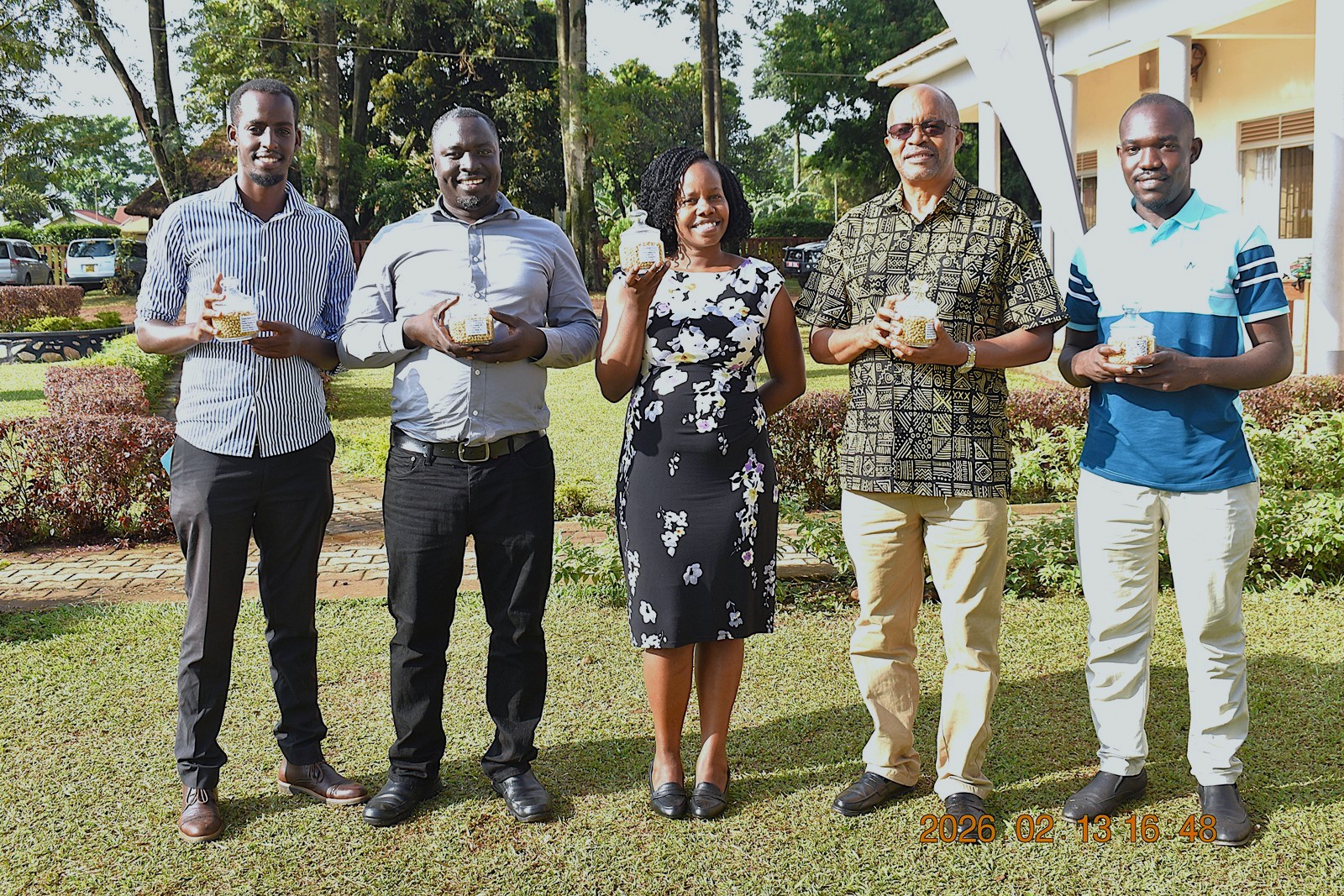
The National Variety Release Committee (NVRC) has officially approved Maksoy 7N, the latest soybean variety developed by the Makerere University Centre for Soybean Improvement and Development (MAKCSID) in the Department of Crop Science and Horticulture, College of Agricultural and Environmental Sciences at Makerere University. The approval was announced during the committee’s 47th meeting at the National Agricultural Research Laboratories (NARL) in Kawanda on 13th February 2026.
The NVRC, chaired by Dr. Joseph Kikafunda, is composed of stakeholders from the Ministry of Agriculture, Animal Industry, and Fisheries (MAAIF), research institutes, seed regulatory agencies, farmers’ organizations, and private seed companies. The committee evaluates new crop varieties for performance and traits before official release, helping to enhance national food security.
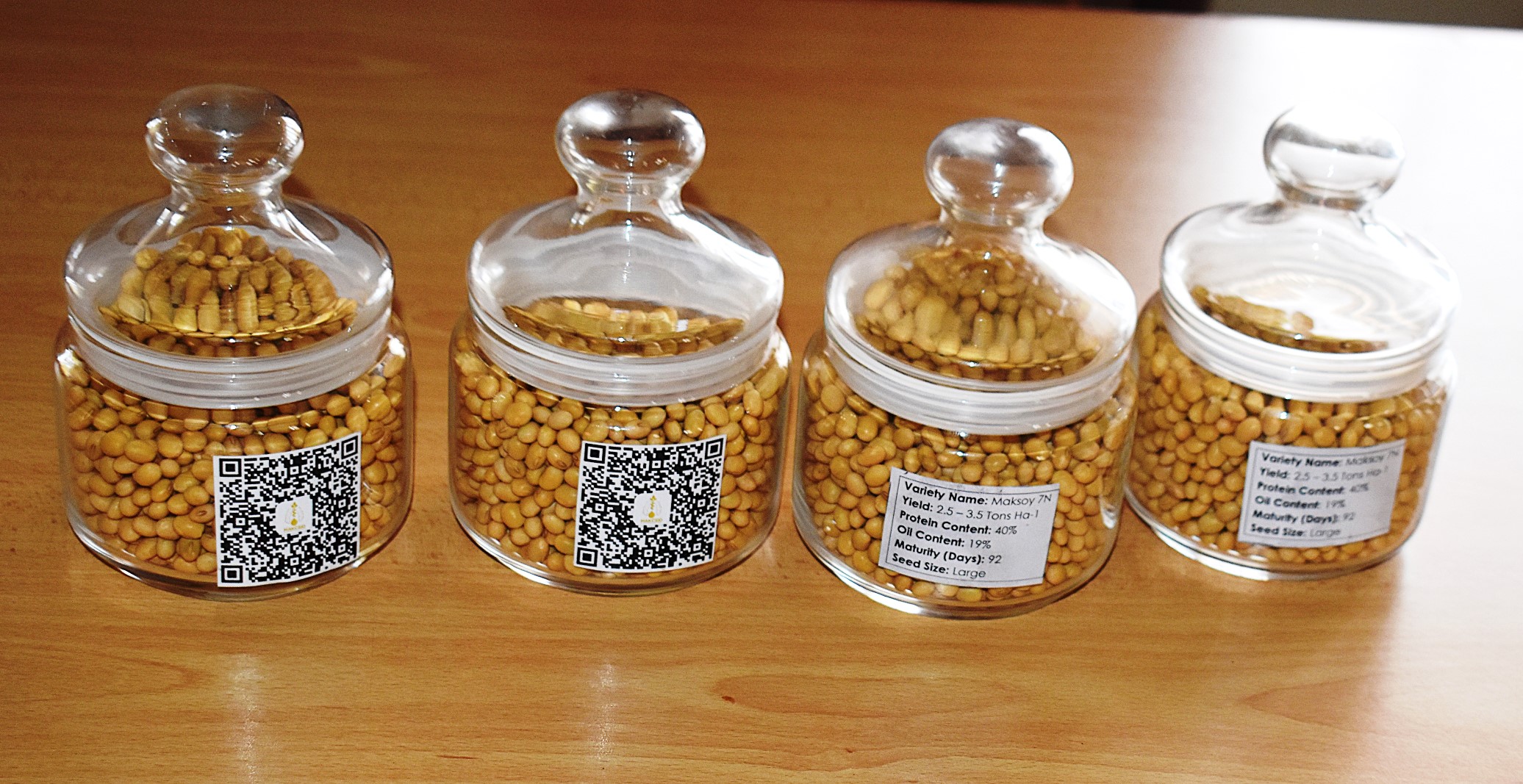
Rigorous Testing Confirms Superior Performance
MakSoy 7N, a cross between 6N and SG underwent extensive Distinctive, Uniformity, and Stability (DUS) testing across multiple seasons and locations in Uganda, including Kabanyolo (Wakiso), Nakabango (Jinja), Ngetta ZARDI (Lira), Abi ZARDI (Arua), Bulindi ZARDI (Hoima), and Mubuku Irrigation Scheme (Kasese).
The trials were conducted in accordance with the Seeds and Plant Act, Cap. 41 and the UPOV guidelines.
Results showed that the variety is clearly distinct from its closest reference, Maksoy 3N, in pod color, stem hair, and seed hilum, with uniformity meeting the 1% off-type standard, and stability confirmed across locations and seasons. On-farm trials were conducted to test performance under farmers’ management and to determine farmer preferences. Following these findings, the National Seed Certification Service (NSCS) recommended Maksoy 7N for release, providing farmers with a high-yielding and soybean rust-resistant variety.
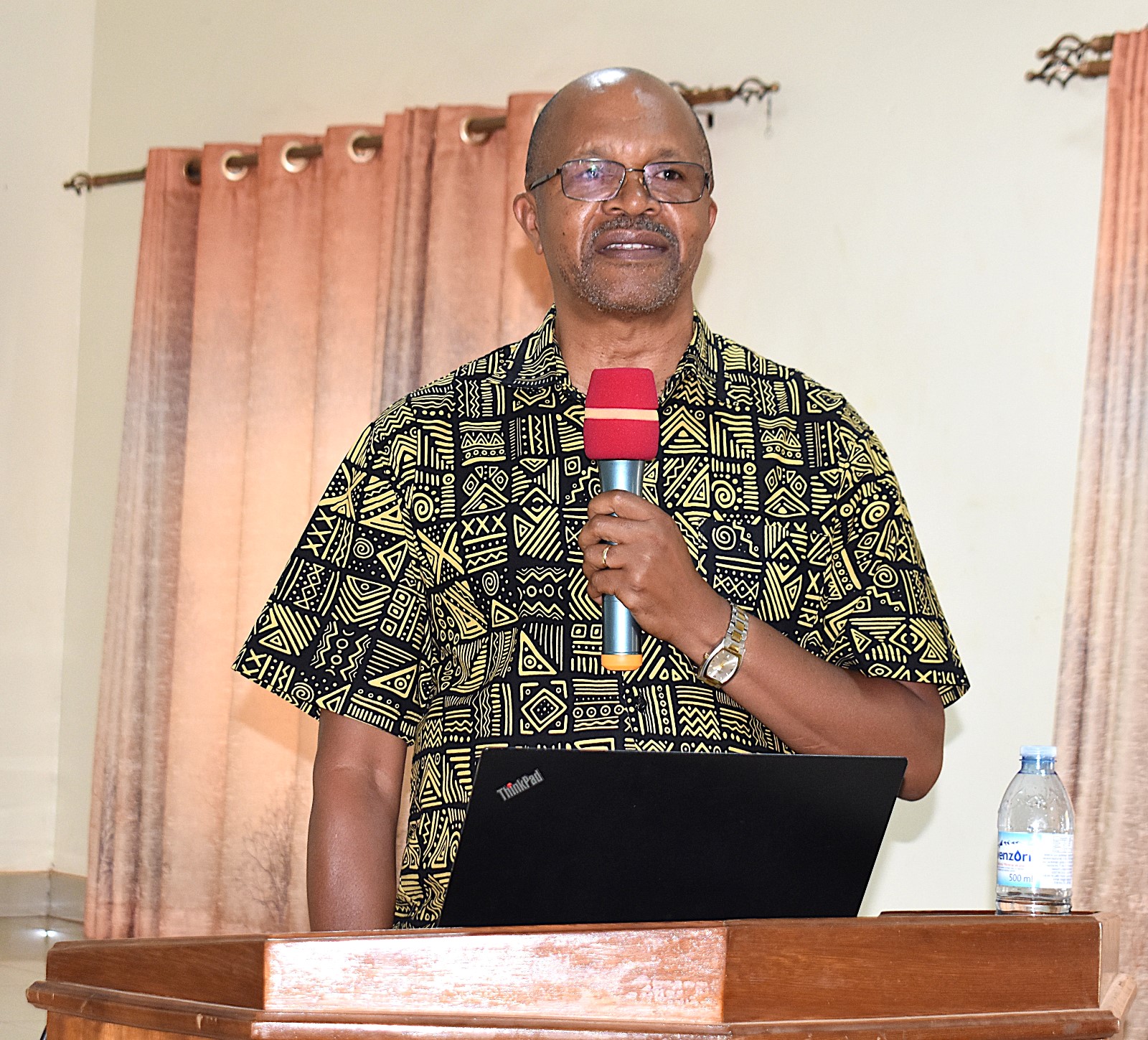
Key Reasons Behind the Development of MakSoy 7N
Soybean plays a critical role in nutrition and income generation, offering 40% protein and 20% oil. It is used in human food, livestock feed, agro-industrial applications, and soil fertility improvement, supporting climate-smart agriculture and reducing reliance on synthetic fertilizers. It also breaks pests life cycle if included in the cropping system.
Maksoy 7N was developed to address yield stagnation, rising disease pressure (including soybean rust), and growing national and regional demand for high-performing varieties. Advanced yield trials across six locations – Kabanyolo (Central), Nakabango (Eastern), Bulindi (Mid-West), Ngetta (Northern), Abi (West Nile), and Mubuku (Western) – demonstrated the variety’s strong performance in both multi-environment trials and participatory on-farm evaluations.
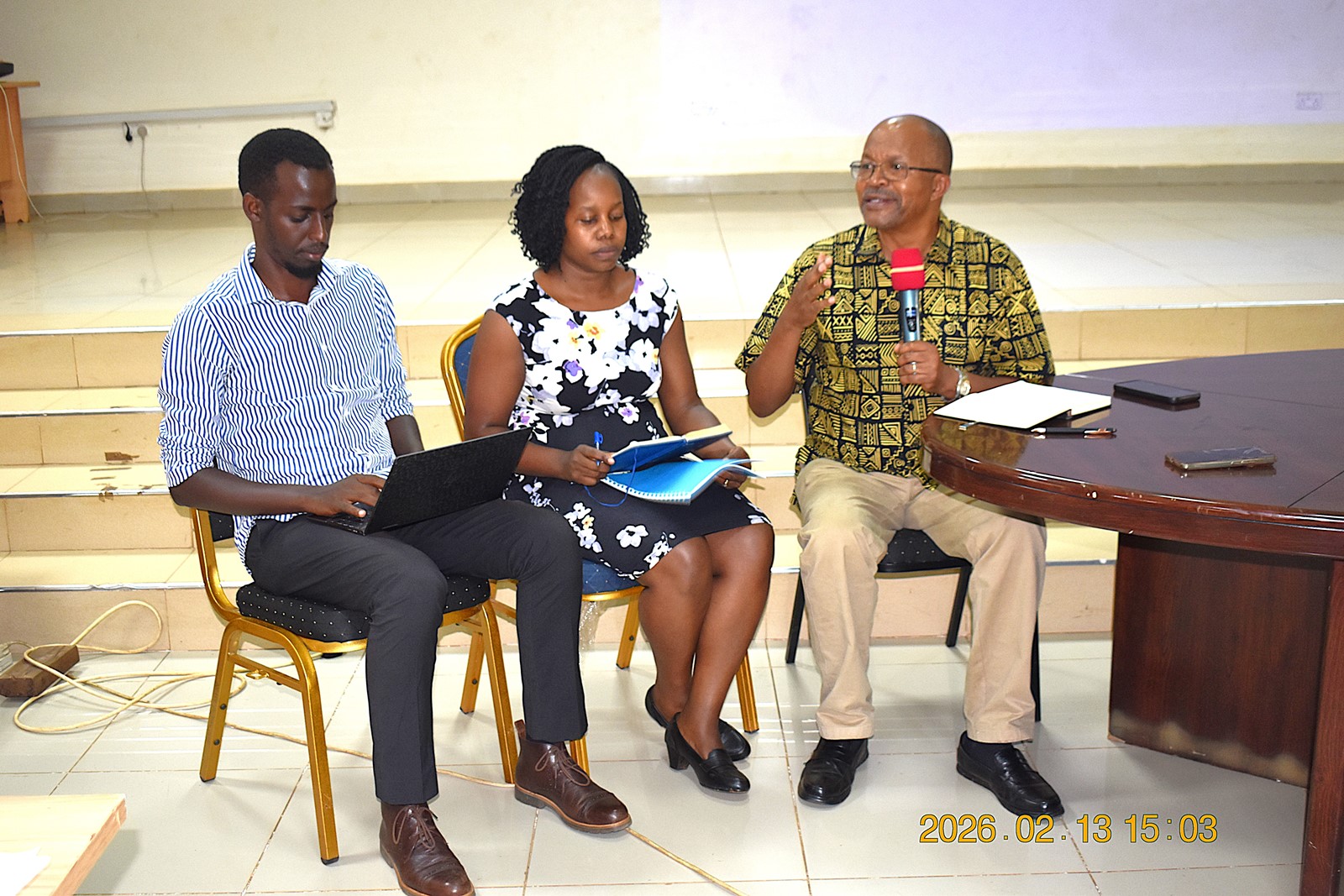
According to Prof. Phinehas Tukamuhabwa, Principal Investigator and Director of MAKCSID, Maksoy 7N demonstrates strong resistance to soybean rust and outstanding agronomic performance. The variety yields between 3-3.5 tons per hectare and matures in approximately three months. Maksoy 7N is expected to enhance national soybean productivity, increase smallholder farmer incomes, and strengthen Uganda’s soybean value chain.
Maksoy 7N joins six previously released high-yielding varieties (Maksoy 1N–6N). Impact studies by the Vegetable Oil Development Project (VODP) reveal that 93% of Ugandan soybean farmers plant Maksoy soybean varieties.
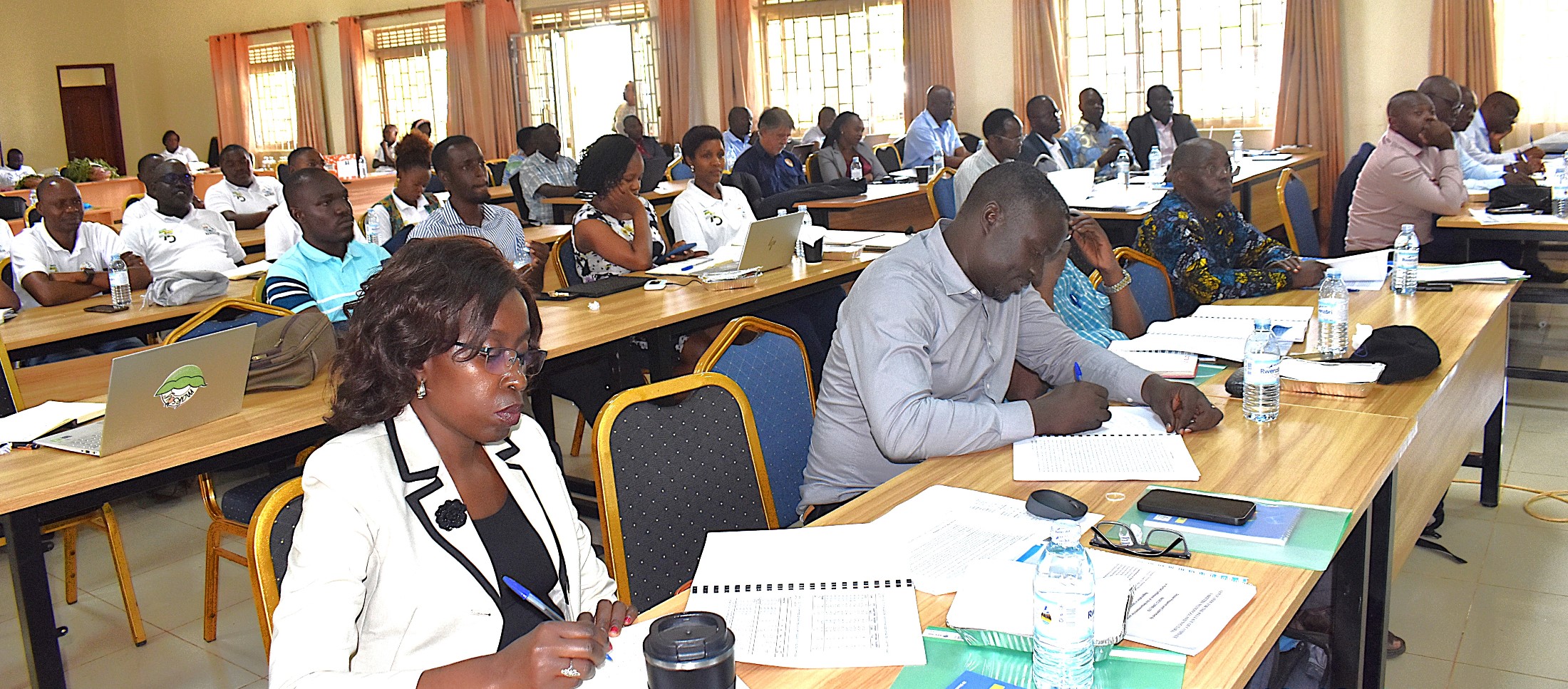
Appreciation to the partners
Prof. Tukamuhabwa expressed gratitude to the local and international development partners for their invaluable support to the project. These partners include the Ministry of Agriculture, Animal Industry and Fisheries (MAAIF), the National Oil Seeds Project(NOSP) and the International Fund for Agricultural Development (IFAD) who funded the research. Other research partners include the National Agricultural Research Organization (NARO), the Regional Universities Forum for Capacity Building in Agriculture (RUFORUM), Integrated Seed and Sector Development Uganda (ISSD Uganda), Soybean Africa Ltd, Makerere University Animal Science Laboratory, Soybean Innovation Lab, International Institute of Tropical Agriculture (IITA), and the host farmers who participated in the on-farm trials.
He also appreciated the Makerere University administration for the support extended to MAKCSID.
Honoring the Research Team
Addressing the meeting, Dr. Kikafunda, Chair of the National Variety Release Committee, praised the research team for their exceptional achievements and steadfast dedication to enhancing the nation’s food security. He emphasized the importance of their work in driving agricultural innovation and urged them to prioritize the rapid multiplication and widespread distribution of the new varieties, ensuring they reach the farmers and contribute to increased productivity and improved livelihoods across the country.
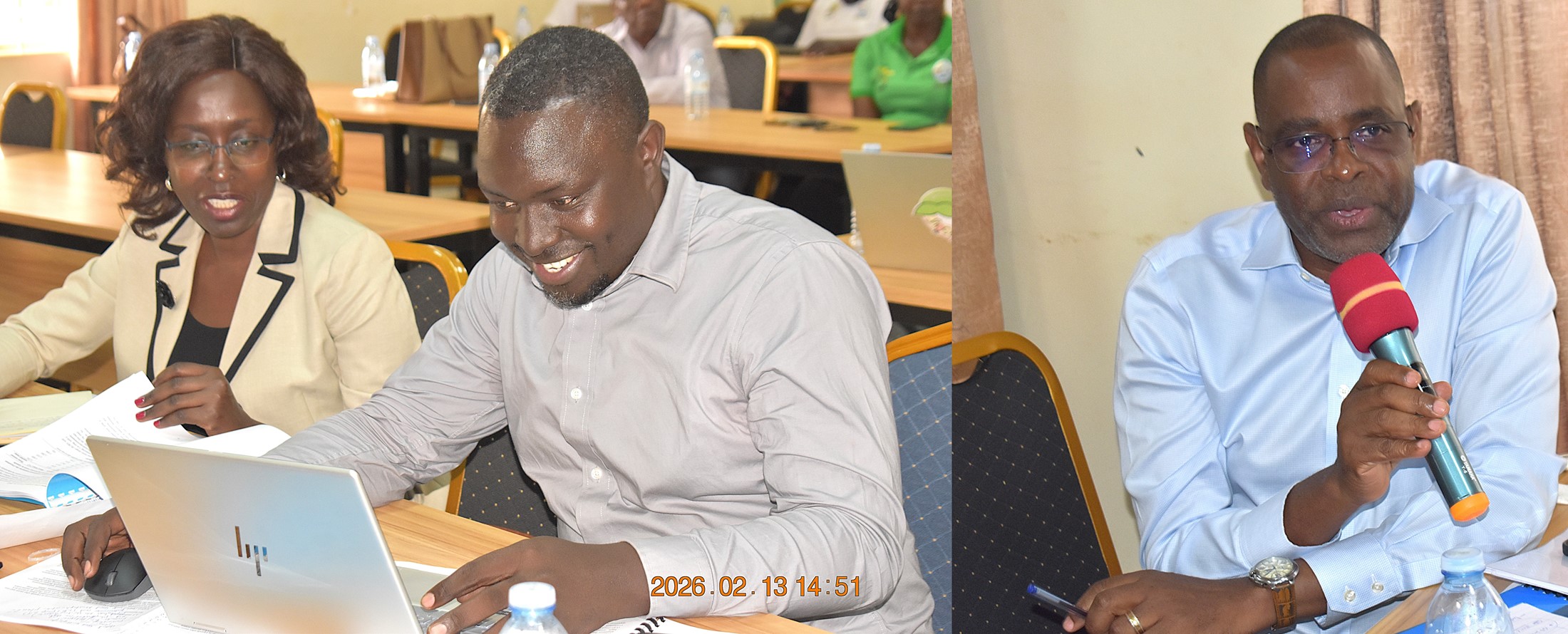
In her remarks, Dr. Mildred Ochwo Ssemakula, Head of the Department of Crop Science and Horticulture at the College of Agricultural and Environmental Sciences (CAES), Makerere University, and member of the National Variety Release Committee, lauded the team for their commitment in developing the new variety, MakSoy 7N. “This is the result of over eight years of dedicated effort. The previous variety, MakSoy 6N, was released in 2017. I deeply appreciate the team’s dedication to field activities. I also commend the former Principal of CAES, Prof. Bashaasha, for his contribution in making the MakCSID a reality, and the current Principal, Prof. Gorettie Nabanoga, for her continued support to the Centre.”
Dr. Ochwo further recognized the pivotal role of Makerere University, particularly CAES, in training critical human resources for the country, noting that most innovators and personnel in key agricultural organizations are graduates of CAES.
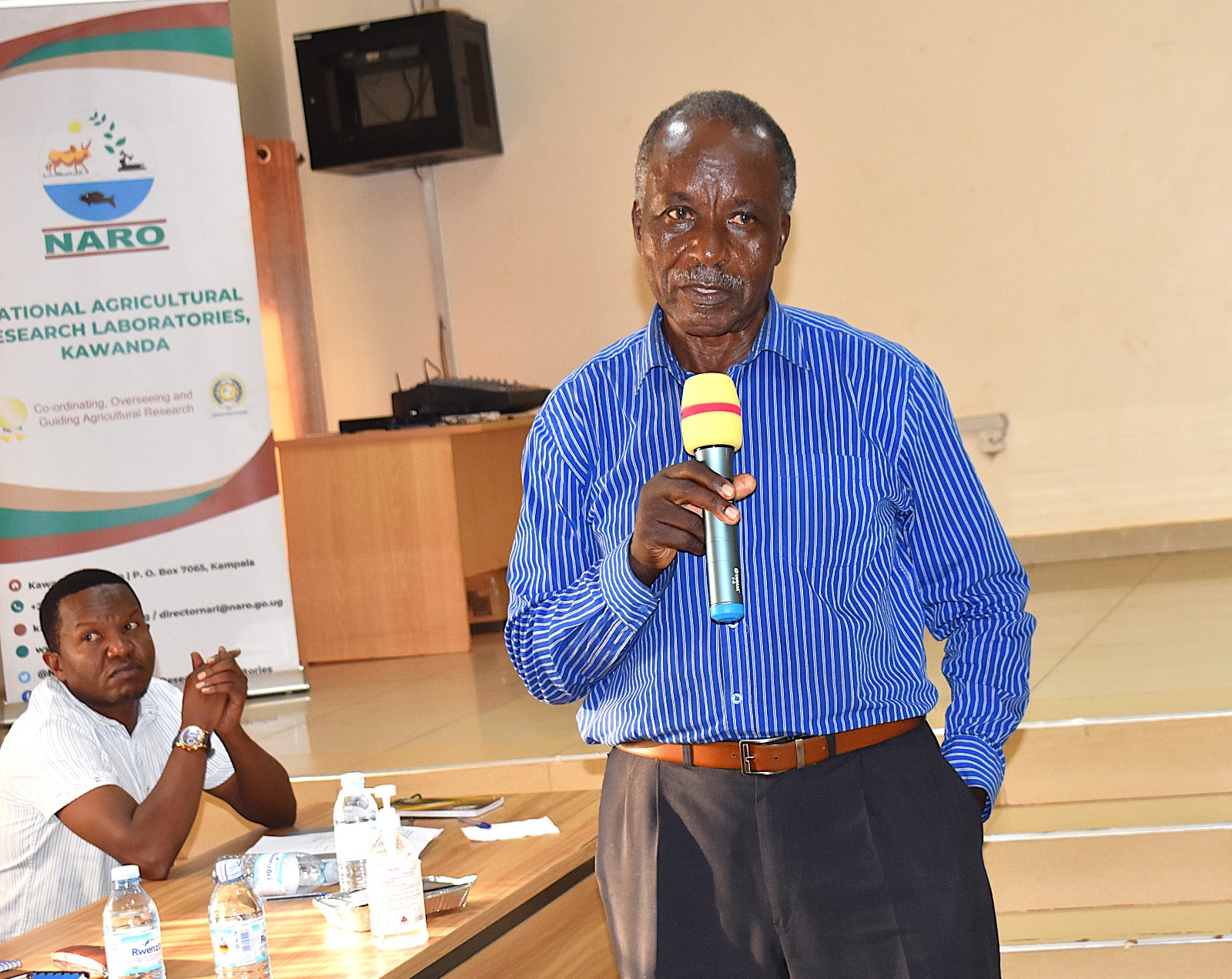
The Soybean research team includes:
- Prof. Phinehas Tukamuhabwa – Breeder & Team Leader
- Dr. Tonny Obua – Breeder
- Prof. Jeninah Karungi – Entomologist
- Dr. Geoffrey Tusiime – Pathologist
- Dr. Thomas Odong – Data Scientist
- Dr. Dennis Okii – Data Scientist/Germplasm Research
- Ms. Mercy Namara – Seed Scientist
- Mr. Alex Malaala – Agronomist
- Mr. George Yiga – Nursery Manager
- Mr. Jordan Uworthrwoth – Germplasm Maintenance
Approval of the Sweet Potato and Sorghum Varieties from NARO and NASECO
At the same event, the Committee approved three purple-fleshed sweet potato varieties – NAROSPOT 8P, 9P, and 10P – developed by the National Agricultural Research Organization (NARO). These varieties are credited for their high yields, strong disease resistance, and abundant provitamin A content. With a short growing period of just three to four months, these sweet potatoes allow farmers to achieve multiple harvests annually, boosting both productivity and profitability.
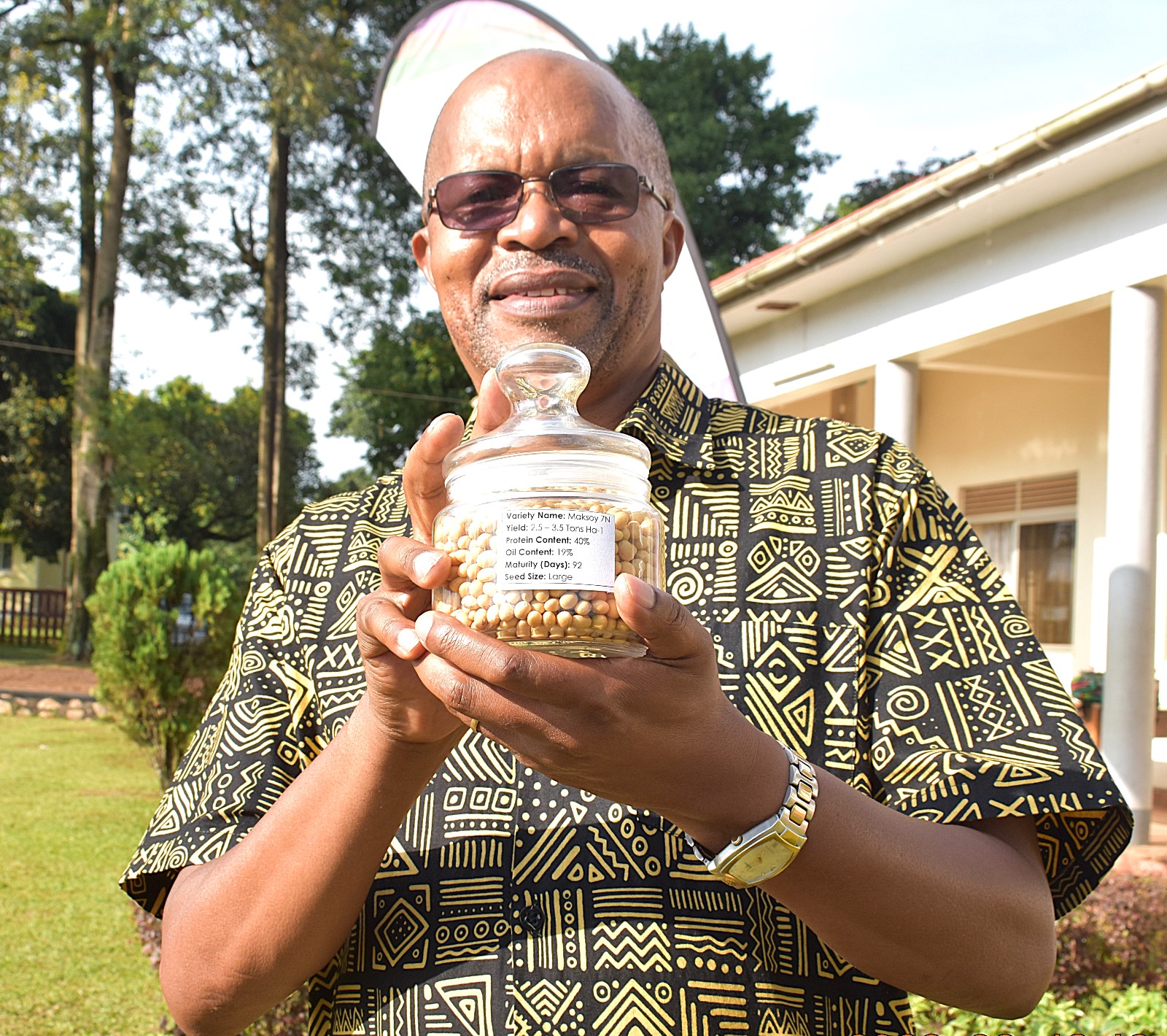
The committee also approved two high-yielding sorghum hybrid varieties, NS1 (Tongo) and NS5 (Tara), from NASECO (1996) (U) Ltd. These varieties are versatile, suitable not only for food consumption but also for livestock feed, bioethanol production, and brewing. Early reports indicate strong adoption rates among farmers, which is expected to reduce dependence on imported hybrid seeds and strengthen the local agricultural seed industry.
More photos from the event
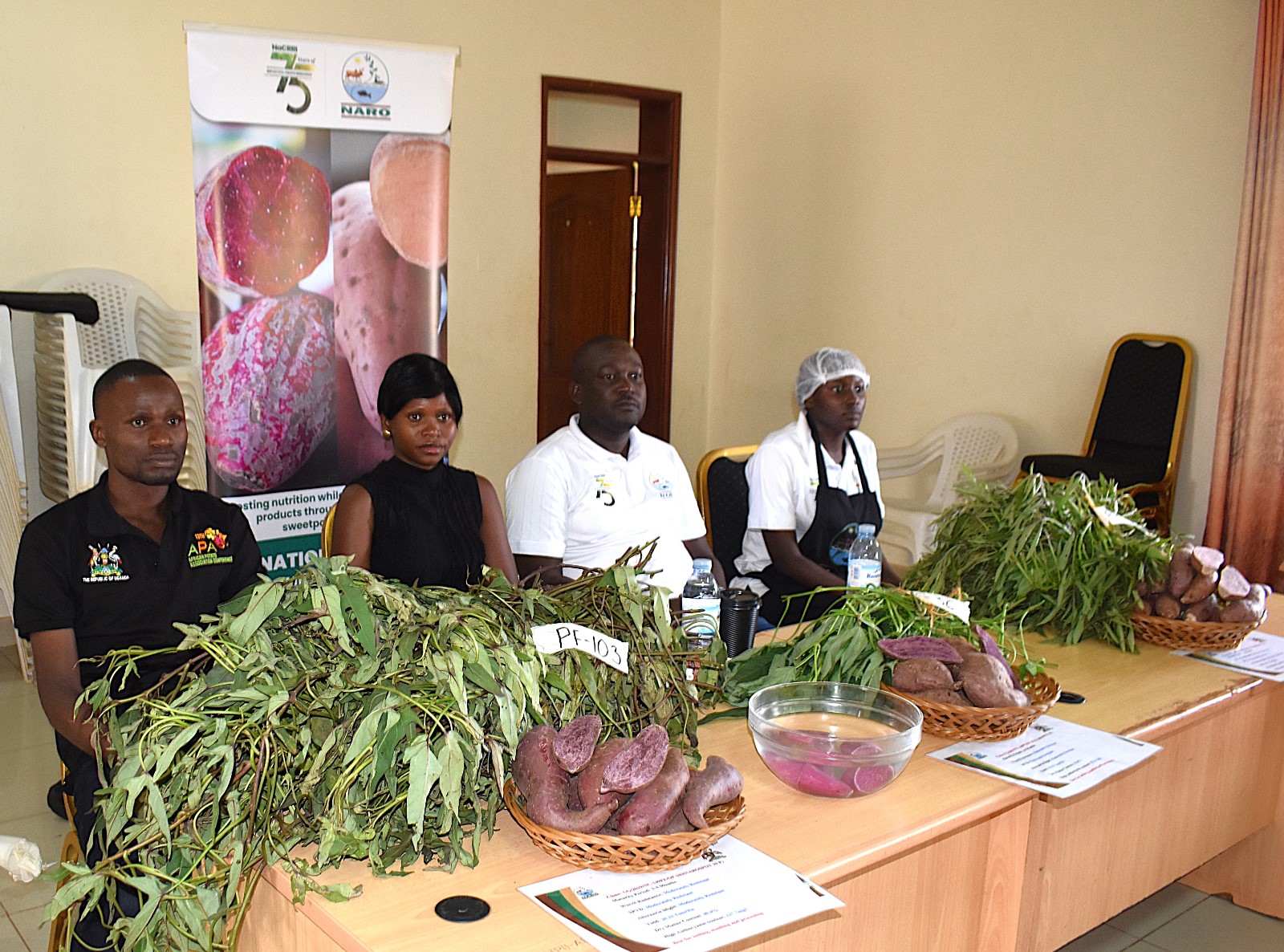
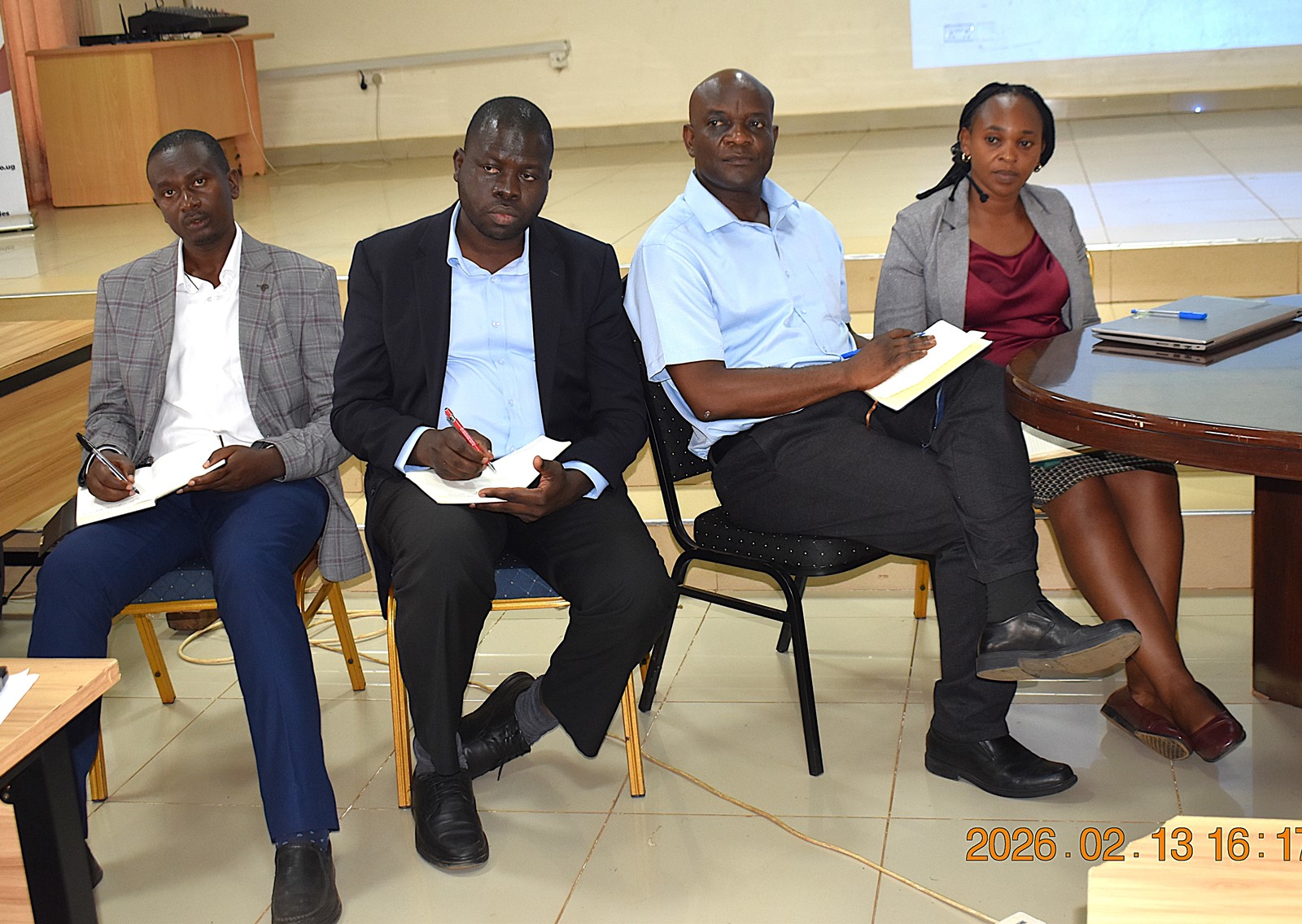
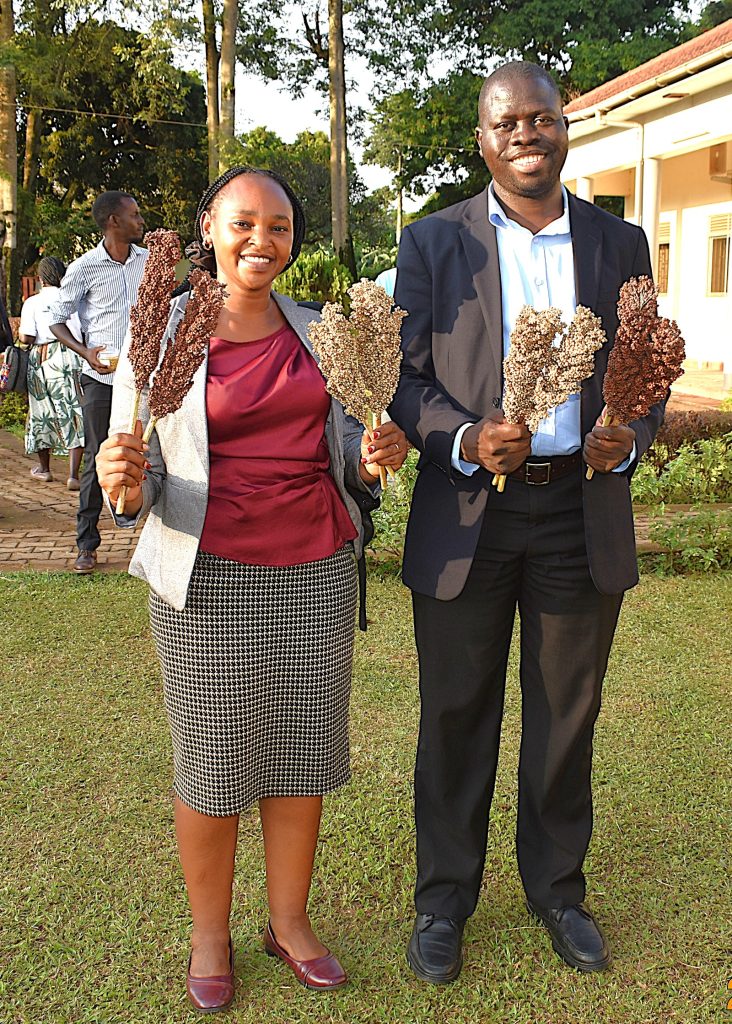
Trending
-

 Humanities & Social Sciences2 days ago
Humanities & Social Sciences2 days agoMeet Najjuka Whitney, The Girl Who Missed Law and Found Her Voice
-

 Health6 days ago
Health6 days agoUganda has until 2030 to end Open Defecation as Ntaro’s PhD Examines Kabale’s Progress
-

 Agriculture & Environment5 days ago
Agriculture & Environment5 days agoUganda Martyrs Namugongo Students Turn Organic Waste into Soap in an Innovative School Project on Sustainable Waste Management
-

 General7 days ago
General7 days agoMastercard Foundation Scholars embrace and honour their rich cultural diversity
-

 Health2 weeks ago
Health2 weeks agoCall for Applications: Short Course in Molecular Diagnostics March 2026
